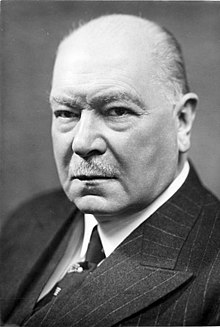Julius Dorpmüller
| Julius Dorpmüller | |
|---|---|

Julius Dorpmüller (1939)
|
|
| Born |
24 July 1869 Elberfeld, Prussia |
| Died | 5 July 1945 (aged 75) Malente, British Zone of Occupation |
| Occupation | General Manager of the Deutsche Reichsbahn, Transportation Minister, Postmaster General |
| Years active | 1898–1945 |
| Known for | leading the German Reichsbahn during World War II |
Julius Heinrich Dorpmueller (24 July 1869 in Elberfeld – 5 July 1945 in Malente) was general manager of Deutsche Reichsbahn-Gesellschaft from 1926 to 1945 and the German Reich Transport Minister from 1937 to 1945.
Dorpmueller was the son of a railway engineer, and studied railway and road construction from 1889 to 1893. After graduating in 1898, Dorpmueller was active in the Prussian state railway administration. In 1907 he stepped down as an executive of the technical office and went into the service of the Schantung railway in Tsingtao. In 1908 he was appointed chief engineer for the German section of the new Chinese Imperial state Tianjin-Pukou railway. Due to the declaration of war by China against the German Reich, he returned as a refugee in 1918, passing through Manchuria, Siberia and Russia to Germany. In the light railway service he was active in the management of the Transcaucasian SFSR railways. In 1919 he became departmental head with German Reich Railways (Deutsche Reichseisenbahnen) in the Stettin district. From 1922 to 30 September 1924 he was a president in the Deutsche Reichseisenbahnen in the Oppeln district, and from 1 October 1924 to 1925 he was president in the Ruhr district; due to his comprehensive experience in light railways, Dorpmueller was consulted as part of the Dawes plan.
After 1925 the board of directors of the German Reich Railway (Deutsche Reichsbahn Gesellschaft) created a position entitled Permanent Representative of the general manager (Head of the Railway), as general manager Rudolf Oeser was seriously ill; Dorpmueller was appointed to this post on 3 July 1925. In December 1925 RWTH Aachen, in acknowledgment of his services to railways awarded him a doctorate in engineering. On 3 June 1926, the day of Rudolf Oeser's death he was selected by the board of directors to become the German railway's general manager. Due to political considerations it was only confirmed on 18 October 1926 by the President of Germany.
...
Wikipedia
